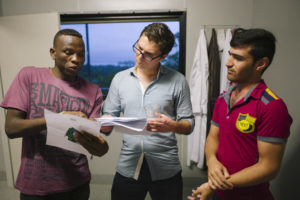On Tuesday 24 October 2017 I participated as a speaker at the Annual Diversity Debate hosted by the Diversity Council Australia (DCA) and moderated by Tony Jones, one of ABC’s most respected
journalists at Dolton House Jones Bay Wharf, Pyrmont.
This year the question was asked: Does a focus on identity help or hinder diversity and inclusion in the workplace? I was on the negative team together with Prof Peter van Onslen, notable political commentator and political journalist for the Australian and Sky News and with Ms Libby Lyons, head of Workplace Gender Equality Agency.
DCA is the independent, not-for- profit workplace diversity advisor to business in Australia. They provide high level advice and strategy to over 400 member organisations across the private and public sectors.As the debate is DCA’s major fundraising event of the year I am pleased to report that the event was NCA best yet, with a record crowd of 462 guests enjoying the thought provoking conversation as well as great food and wine, all in a fabulous setting.
The discussion shed valuable light on the positives and negatives of a focus on identity and provides employers with food for thought when it comes to their own Diversity and Inclusion programs.
Event partner Bloomberg have shared with us the exciting news that #DCAdebate ranked as the top trending topic on social media in Australia as of 7:30pm on 24 October and remained in #2 rank thereafter until 11:30pm, which was just an incredible outcome.
You can view photographs of the event on our DCA Debate photo album on Facebook and you can read our eNews – feel free to share both. A highlights video of the Debate will be uploaded to the DCA website in the next week or so, and media coverage of the event and other DCA activities can be found in the News section of our website.

